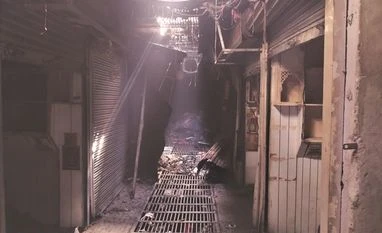It’s been some days since a fire gutted around 150 shops at the Marwari Katra market of Chandni Chowk, a busy shopping area next to a primary school in the heart of Old Delhi. Initially, some 14 fire tenders were sent to Marwari Katra —sprinkled with textile warehouses and plenty of bridal wear shops — and then some more had to be called as the fire raged. It took the fire fighters hours to douse the flames. Cinders remain.
Mahesh Kapoor calls himself lucky as his textile shop is right on the main road where the tenders stopped. “The ones who had shops inside the market could not be saved. How can you rush in this huge truck inside these narrow lanes?” Electricity connection was snapped after the fire that is believed to have been caused by a short circuit in a nearby bookshop. The fire department did not report any casualties.
Officials at the site pointed at hanging overhead wires, densely packed shops and near-to-no preparedness among the major hindrances. Even so, the situation now is better compared to 2022 when Bhagirath Palace, a wholesale electrical market in Chandni Chowk, had a massive fire. Narrow lanes packed with inflammable goods, water shortage, and weak buildings were some of the issues back then. The Bhagirath fire, that gutted some 200 shops, took five days to be extinguished.
While shopkeepers contemplate the future, Hari Om Goyal cannot take his eyes off his charred shop. Goyal, who lost his clothing shop and goods worth Rs 40-50 lakh to the fire, says, “We had four fire extinguishers but in such a situation those are of no use.”
Delhi Fire Services Director Atul Garg blames the extreme summer season. “Fire incidents are directly proportional to the temperature… The other reasons are compromised electric wiring, short circuits, or blasts near electric poles. Based on the data that I have analysed, 70 per cent of fires are due to faulty electric wiring,” Garg noted.
A similar reason is reported to have led to a fire in Southeast Delhi’s Shaheen Bagh area earlier this month. According to department officials, the fire destroyed three restaurants, two shops, and several flats on 40 Feet Road, which is home to many eateries. There were no casualties reported in the incident.
According to data from the fire service department, incidents have only increased in 2024. In May, the department registered 5,218 distress calls, a 56.2 per cent year-on-year jump.
Besides marketplaces, industrial areas in the National Capital Region have also reported major fire breakouts.
On Sunday, for instance, a huge fire broke out in a three-storey LED manufacturing factory, some 25 km west of Old Delhi in the Mundka industrial area. Close to 100 firefighters had to be deployed at the site. According to an official, the factory didn’t have a fire no objection certificate (NOC), and the fire safety arrangements were close to none.
Not far from Mundka, earlier in June, three people died in a fire that broke out in a factory in Narela industrial area.
“Businessmen and factories are not abiding by basic rules such as electric audits of their buildings. Delhi has around 40,000 industries, but we have sanctioned NOCs for only 1000-1,200 factories….,” Garg said. “Getting an NOC is a rule, but if people are not abiding by it, we cannot go on punishing everyone.”
Fire at a private nursing home in East Delhi’s Vivek Vihar is another such case. Last month, seven newborns were charred to death after a children’s hospital in east Delhi’s Vivek Vihar caught fire. Reports suggest that the hospital was functioning despite an expired licence.
This incident prompted a public interest litigation in the Delhi High Court, which argued that fire safety measures, such as fire extinguishers and automatic fire alarms, should be mandatory for all buildings. Earlier this month, the HC directed the Delhi government to decide on a representation to formulate basic fire safety norms for smaller hospitals and nursing homes in the national capital. The court has mandated an action taken report to be filed within eight weeks.
In Delhi, of the 1,225 hospitals, only 193, including private and government and nursing homes, have a valid fire safety clearance (FSC) approved by DFS, data shared by the department shows. As per Rule 33 of the Delhi Fire Services rule book, a fire safety clearance certifies that a building has been deemed fit to comply with fire prevention and safety requirements.
“We are requesting the government that every year these businesses and premises that they work in should get their electric audit done from a government approved electrician and submit a report to us,” Garg pointed out. Without that, NOC should not be issued, he says.
Unlock 30+ premium stories daily hand-picked by our editors, across devices on browser and app.
Pick your 5 favourite companies, get a daily email with all news updates on them.
Full access to our intuitive epaper - clip, save, share articles from any device; newspaper archives from 2006.
Preferential invites to Business Standard events.
Curated newsletters on markets, personal finance, policy & politics, start-ups, technology, and more.
)